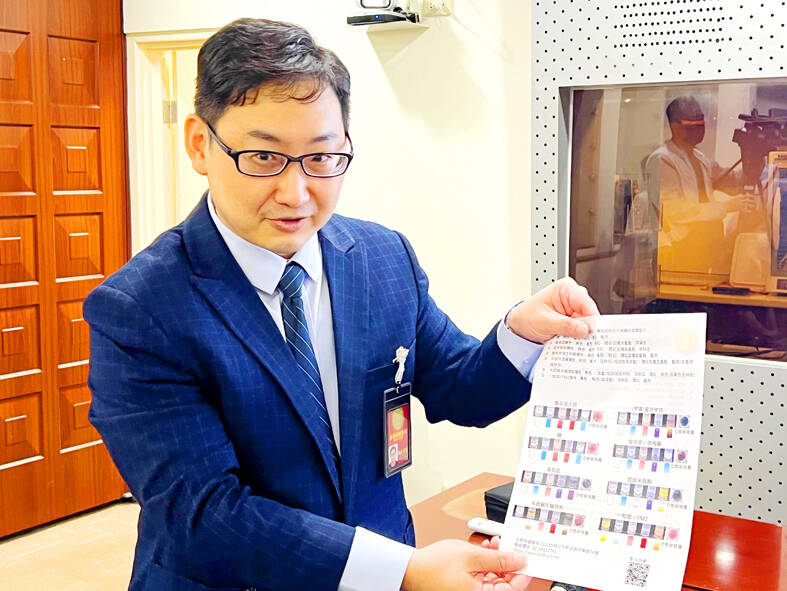Forensic scientists in Taiwan have developed a portable testing kit for police to quickly identify illegal synthetic drugs, and have shared it with 15 other countries, the Ministry of Justice Investigation Bureau (MJIB) said yesterday.
The drug testing kit for multiple types of chemical compounds can provide results in five minutes with an accuracy of 95 percent, MJIB Forensic Science Division officer Yen Yao-te (顏堯德) said.
The kit uses fluorescent nanomaterials that change color when coming into contact with the active compounds in drugs ranging from heroin and cocaine to ketamine and nimetazepam, Yen told a news conference at the ministry in Taipei.

Photo: Wu Cheng-feng, Taipei Times
Yen, who has a doctorate in chemistry from National Taiwan University, led the division in creating the testing kit.
“It was done entirely in-house,” he said.
A quick result is obtained using the portable kit by shining a fluorescent light on solutions in small test tubes, Yen said, adding that it is much faster than sending suspicious materials in pouches to laboratories for testing with a turnaround time of at least one day.
The portable kits are also inexpensive to produce at about NT$300 per unit and are an improvement on portable systems used by other countries, he said.
The methodology for producing the kit has been published in Forensic Science International, Advanced Materials Technologies, Sensors and Actuators, and other international journals.
Deputy Minister of Justice Chen Ming-tang (陳明堂) said the kit is an excellent new tool for combating drug smuggling from foreign countries, as the ministry and law enforcement agencies are striving to prevent drugs from reaching schools.
Chen said the kit also helped in promoting friendly ties, as the new kits have already been presented as gifts to 15 countries thus far, including Taiwan’s diplomatic allies Paraguay, Guatemala, Nicaragua, Honduras, the Marshall Islands, Tuvalu, Nauru and Palau.
The ministry has also held talks and given the new kits to the justice ministries of Vietnam, Thailand, Indonesia, Malaysia, the Philippines, India and Myanmar, Chen said.

The Ministry of Education (MOE) is to launch a new program to encourage international students to stay in Taiwan and explore job opportunities here after graduation, Deputy Minister of Education Yeh Ping-cheng (葉丙成) said on Friday. The government would provide full scholarships for international students to further their studies for two years in Taiwan, so those who want to pursue a master’s degree can consider applying for the program, he said. The fields included are science, technology, engineering, mathematics, semiconductors and finance, Yeh added. The program, called “Intense 2+2,” would also assist international students who completed the two years of further studies in

Former president Tsai Ing-wen (蔡英文) departed for Europe on Friday night, with planned stops in Lithuania and Denmark. Tsai arrived at Taiwan Taoyuan International Airport on Friday night, but did not speak to reporters before departing. Tsai wrote on social media later that the purpose of the trip was to reaffirm the commitment of Taiwanese to working with democratic allies to promote regional security and stability, upholding freedom and democracy, and defending their homeland. She also expressed hope that through joint efforts, Taiwan and Europe would continue to be partners building up economic resilience on the global stage. The former president was to first

Former president Tsai Ing-wen (蔡英文) on Monday called for greater cooperation between Taiwan, Lithuania and the EU to counter threats to information security, including attacks on undersea cables and other critical infrastructure. In a speech at Vilnius University in the Lithuanian capital, Tsai highlighted recent incidents in which vital undersea cables — essential for cross-border data transmission — were severed in the Taiwan Strait and the Baltic Sea over the past year. Taiwanese authorities suspect Chinese sabotage in the incidents near Taiwan’s waters, while EU leaders have said Russia is the likely culprit behind similar breaches in the Baltic. “Taiwan and our European

The Taipei District Court sentenced babysitters Liu Tsai-hsuan (劉彩萱) and Liu Jou-lin (劉若琳) to life and 18 years in prison respectively today for causing the death of a one-year-old boy in December 2023. The Taipei District Prosecutors’ Office said that Liu Tsai-hsuan was entrusted with the care of a one-year-old boy, nicknamed Kai Kai (剴剴), in August 2023 by the Child Welfare League Foundation. From Sept. 1 to Dec. 23 that year, she and her sister Liu Jou-lin allegedly committed acts of abuse against the boy, who was rushed to the hospital with severe injuries on Dec. 24, 2023, but did not